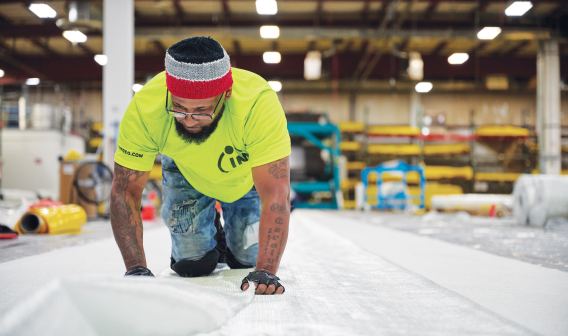A Partner in Solving Crucial Logistics Issues
A Conversation With Mike Coleman
Mike Coleman is president and CEO of CV International, a Norfolk-based global logistics, freight forwarding, and trade compliance services provider, and Capes Shipping Agencies, a wholly owned subsidiary that provides ship agency, cargo forwarding, and logistics management services to clients. He has served on numerous boards for the logistics industry, including a current appointment to the Virginia Port Authority Board of Commissioners.
VEDP: Can you give us a high-level overview of CV International’s history and offerings in the third-party logistics space?
Mike Coleman: My father started the company back in 1984. He saw the need for a personalized, high-touch freight forwarding service in Norfolk, and he struck out on his own with the help of my mother and my grandmother. I came back into the family business after graduate school with the task of taking the company to the next level of growth.
We’ve grown steadily since our founding. We’ve expanded our suite of logistic services to include everything from customs brokerage to air freight forwarding to truck brokerage and warehousing to ship agency and bulk shipping under our Capes Shipping Agencies brand — and, most recently, shore-side marine support for the booming offshore wind industry in Virginia.
Our focus really continues to be providing seamless, personalized international logistics and compliance solutions for our clients. We operate as if we’re our client’s transportation department or their office in port, as the case may be. We really see ourselves as an extension of our client’s business.
VEDP: You’re intimately familiar with The Port of Virginia as a logistics operator in Hampton Roads and as a member of the port’s Board of Commissioners. What are the main topics this group is concerned with presently?
Coleman: We’re very fortunate to have an incredibly talented leadership team at The Port of Virginia and a best-in-class, very well-run, efficient port. The port recently became the first port on the East Coast to power its terminals 100% by clean energy, and the goal is to have net-zero carbon emissions by 2040. That is a significant accomplishment. We just completed the dredging and opening of the widest shipping channels on the East Coast, allowing for unimpeded two-way traffic in our port. There are also major ongoing investments in port infrastructure, such as the Gateway Investment Program currently underway and expansions and improvements to our inland terminals in Richmond and Front Royal.
The port has been heavily focused on strategic growth as an economic driver for the Commonwealth. Its efficiency, wide variety of ocean carrier services, and intermodal connectivity make it a significant selling point for companies looking to locate here in Virginia. We’re very fortunate to have this incredible port, this incredible gateway to the world, right in our own backyard. The fact that Virginia continues to invest in its port and its efficiency serves as a tremendous advantage for users.
[The Port of Virginia’s] efficiency, wide variety of ocean carrier services, and intermodal connectivity make it a significant selling point for companies looking to locate here in Virginia.
VEDP: What are you seeing in the supply chain industry from your perspective? Where is your energy focused?
Coleman: I think like most industries, we’re seeing a rapid acceleration of data-driven technologies and the potential for artificial intelligence to play a massive role in our own space. The problem in our industry is that it has always been fairly slow to adapt, and the source information upon which humans or tech make decisions has been really unreliable or otherwise incomplete.
We’ve been heavily focused on marrying our exceptional service, the human element, with exceptional data and the latest visibility technologies to help our clients make better decisions. Our focus is always going to be on our people and providing them with the resources and technologies that they need in order to deliver a market-leading service to our clients, whether it involves moving a container from Shenzhen to Norfolk or a coal ship loading in the middle of the night in Baltimore.
VEDP: Looking beyond the port, how are other segments of the supply chain responding to the increased focus on resilience and the need to adapt? Are you seeing alternate modes of transport, such as transloading, domestic consolidations, and perhaps even air freight, factoring more into your customers’ overall logistics plans?
Coleman: We’re living in a very volatile world right now, and then you have all these unknowns that come up, like recent events like the Key Bridge collapse in Baltimore and the Red Sea crisis. It underscores the inherent unpredictability in global supply chain and logistics and reinforces the fact that it’s more important than ever right now that companies are building their supply chains to be very resilient and dynamic.
In the years since the COVID-19 pandemic, we’ve seen companies generally fall back on this just-in-time inventory methodology. In this environment for global trade, we may not always find that to be sufficient. We frequently urge our customers to use very specific advanced planning in their supply and their supply chains, look ahead for bottlenecks, and then eliminate them or develop contingency plans. It’s more of a just-in-case strategy to help avoid the kind of complications that can disrupt supply chains.
We try to help our clients think three steps ahead and have alternatives available to accommodate for disruptions in the supply chain. Disruptions might come in the form of the Red Sea issues that we’re seeing, or low water in the Panama Canal, but they also might be more specific to a client, like unanticipated shortages of raw materials at a factory.
VEDP: What challenges are CV International’s clients coming to the company to help solve in 2024? Are your clients focused on primarily tactical, near-term behaviors, or have they shifted to longer-term planning and overall supply chain design? How does the company differentiate itself in a crowded marketplace?
Coleman: Looking forward into the rest of 2024, I think geopolitical problems are going to persist, and companies need to be planning for them. There are also other potential disruptors, such as potential labor actions on the East Coast. Companies need to be thinking about that and just be ready to pivot if things don’t go the way we expect them to.
Our value to our clients this year has really been centered on being dynamic and bringing a lot of logistics options to the table, whether it be multiple ocean lines and services, routings, air and truck freight options, or something totally outside of the box. We, as a freight forwarder, need to be kind of a Swiss Army knife for our client partners, and that’s part of how we differentiate ourselves in our space.
VEDP: Technology and innovation are common points of emphasis these days. Where do you see technology having the most impact from a data perspective?
Coleman: Advancements in AI and data visibility will continue shaping supply chains in the months and years ahead, although I think we’ve yet to see exactly how and what the most appropriate use cases will be for new technologies. As I mentioned earlier, in our industry we have some issues with data quality. The variety of players in the space and the number of links in any supply chain spanning multiple countries and regions mean that there are often a lot of gaps in data.
Currently, shippers, purchasers, and logistics providers often have to use what tools and data they have available to them to find workarounds for the anomalies. I think AI is going to help fill in those gaps. But in the end, I still think it’s going to be a tool, and not a silver bullet for these issues. The best solutions — in the near term, anyway — will be combining AI tools with human expertise, particularly in the areas of our business that are highly regulated, such as customs brokerage.
We’re also hearing from many of our customers that sustainability is becoming more and more essential, both internally and from their customers further downstream. The sustainability journey is going to start with data gathering. To know where you’re going, you first need to know where you’re currently standing, and tracking data points like carbon emissions is increasingly becoming more than just a nice-to-have, but a prerequisite for doing business with a lot of our clients.
VEDP: Where should companies focus their own investments, and how should they be collaborating with their partners to navigate today’s complex environment?
Coleman: For anybody shipping globally, there needs to be a very strong focus on resilience and innovation. They’re going to find returns there. Building resilience starts with strategic forecasting, anticipating disruptions and building redundancies in the supply chains, and investing in cybersecurity measures.
On the innovation front, we’re talking about how automation, data analytics, and AI are becoming game-changers in our business in the way they can optimize efficiency and generate insights that will reshape global trade. In any industry, companies need to be looking toward AI as a way to make their operations more efficient.
Collaboration is going to be key in making this work. Companies should make efforts to share insights with their partners throughout the supply chain. It’s through this sort of collaborative approach that companies are really going to reap the benefits of resilience and innovation. For the upcoming year, building resiliency in your supply chain is going to be critical.
VEDP: Automation in the e-commerce and fulfillment segments of the logistics sector gets significant attention. Tremendous research is going into autonomous vehicle development as well, from individual consumer delivery to autonomous trucking at scale focused on the “middle mile.” How is the logistics industry adapting to these innovations?
Coleman: Well, there’s clearly a lot of potential for automation and autonomous vehicles to really transform the industry. Automation, whether in fulfillment or elsewhere, brings opportunities for tremendous efficiency and cost savings. While the technology isn’t quite there yet, I think it’s clear that the day is going to come when these driverless trucks are going to be part of every supply chain.
There’s been a lot of talk about job displacement, but I don’t think that this will necessarily be a case of machines replacing workers entirely, but rather an example of collaboration between the two. While there may be large portions of the middle mile that become autonomous and can be navigated successfully, it looks like, at least for the foreseeable future, the skills and judgment unique to human drivers will be necessary for those first and last miles, particularly in cities and more populated areas and even in the ports. We’re a ways off from automated trucks going into and out of our ports and driving in our populated areas, but that middle mile is where I see it potentially having some success.
While there may be large portions of the middle mile that become autonomous and can be navigated successfully, it looks like, at least for the foreseeable future, the skills and judgment unique to human drivers will be necessary for those first and last miles.
VEDP: What additional risks around supply chains haven’t we discussed that you see either on the horizon or perhaps remain ever-present? How should companies be looking at mitigating these risks?
Coleman: We’ve experienced sustained economic growth and decades of globalization, but we’re seeing increased pressure due to geopolitical tensions, whether it be the disruptions in the Red Sea, or what’s going on in the Middle East and Europe right now, or even our relationship with China.
Technology has presented many opportunities, but the current market comes with a number of risks. Companies can help mitigate that risk with strategic advanced forecasting — building redundancies in their supply chains and their sourcing strategies and continuing to build strong relationships with their partners in the supply chain. Open communication and collaboration allow for quicker responses to disruption. Planning ahead, forecasting, and being prepared for that worst-case scenario allow for quicker responses to disruption. Part of what we’re trying to do for our clients is to be that backup plan for them if things go sideways.
VEDP: On a personal note, do you have any recent discoveries in your leisure time that stand out in the Hampton Roads community? Any favorites elsewhere in Virginia?
Coleman: The one thing that I love the most about Hampton Roads is the fishing. Unfortunately, I don’t have a lot of free time right now to be fishing, but when things lighten up for me, I’m going to get back out on the water. We’re blessed in Hampton Roads to have a lot of opportunities to target a wide variety of fish, both in the bay and in our inlets and our rivers, as well as offshore. I’m particularly looking forward to cobia fishing this summer in Chesapeake Bay. I’m going to be very intentional about that this year.




